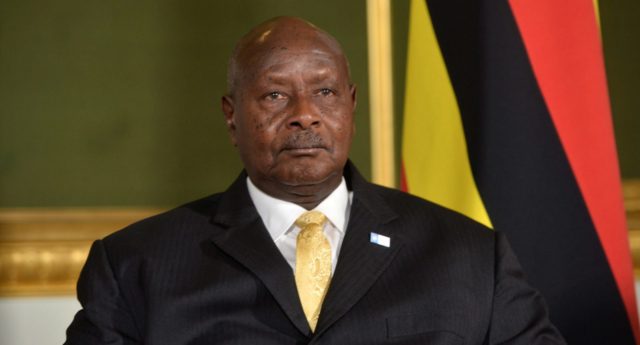Uganda’s President Yoweri Museveni has described the continued trafficking of counterfeit, substandard, and falsified medicine and health product on to the African continent as a “crime against humanity” and huge risk for countries all over the world.
According to a Uganda State House news release Museveni made the remarks at the just concluded two day summit aimed at finding a lasting solution to the continued trafficking of counterfeit, substandard and falsified medicines and health products on the African continent.
The summit that took place in Togolese capital Lome was organised jointly by the government of Togo and the Brazzaville Foundation a non-governmental organisation devoted to the promotion of peace, health and development on the African continent.
It was attended among others; by the host President Faure Gnassingbe, President of Senegal Macky Sall and Prince Michael of Kent who is a co-convener as well as representatives from the government of the Republic of Congo, Ghana, Niger and Gambia.
Museveni said, that besides causing the loss of close to one million people on the African continent annually, the trafficking of medicine harms patients as they fail to treat the diseases they are intended to cure.
He added that the adulterated medicine also leads to loss of confidence in medicine as well as medical practitioners and the health systems that lead to citizens resorting to alternative medicines that are in most cases ineffective.
Museveni further said that substandard and falsified medicine and medical products lead to antimicrobial resistance and drug resistance infections making the genuine drugs ineffective.
He said counterfeit medicines have been linked to trans-national organised crime with an increasing number of cases of those involved in this trade being involved in terrorism among other crimes thus posing a great danger to global security.
He appealed to all countries in the world as well as those organisations involved in offering health care services to join hands to eliminate the continued trafficking of counterfeit medicine on the market since they are smuggled on to the market using the same routes and techniques as drugs, weapons and human trafficking.
He particularly called on the African leaders to work together and form a system that is managed and regulated by the continent which he said will require investing in research and health related technologies and promote innovation of new products where possible to enable citizens access quality medicine easily and cheaply.
On his part President Faure Gnassingbe of Togo said that his government had convened the conference for Africa to forge away on how to combat the trafficking of fake drugs to the continent and called on the African Union and United Nations to support the cause because of the devastating effects of the vice on the continent.
President Faure wondered why there was an urgent call from the world to safeguard the environment but there was no attention being given to millions of Africans that are losing their lives due to trafficking of counterfeit drugs.
He observed that the reported income of 200 billion US dollars that is earned from trafficking in counterfeit medicine annually is far higher than the income from drug and human trafficking and wondered why governments and humanity in general do not give the vice the needed attention.
President Macky Sall of Senegal observed that fake drugs do not heal but are silent killers and are sources of funding for transnational crimes especially terrorism and called on all governments in the world to join hands to combat them.
He however said that because of poor monitoring mechanism and technical capacity, Africa was finding it difficult to differentiate between falsified medicine and genuine medicine and called all countries to join hands and develop this capacity.
The Director `general of the World Health Organisation Tedros Adhanom Ghebreyesus agreed with President Museveni that combating falsified and substandard medicines will protect peoples health and promote greatly needed social-economic development in Communities in Africa.
The World Health Organisation (WHO) says an estimated 1 in 10 medical products circulating in low- and middle-income countries is either substandard or falsified, according to new research.
This means that people are taking medicines that fail to treat or prevent disease. Not only is this a waste of money for individuals and health systems that purchase these products, but substandard or falsified medical products can cause serious illness or even death.
Since 2013, WHO has received 1500 reports of cases of substandard or falsified products. Of these, anti-malarials and antibiotics are the most commonly reported. Most of the reports (42%) come from the WHO African Region, 21% from the WHO Region of the Americas, and 21% from the WHO European Region.
CN/abj/APA


